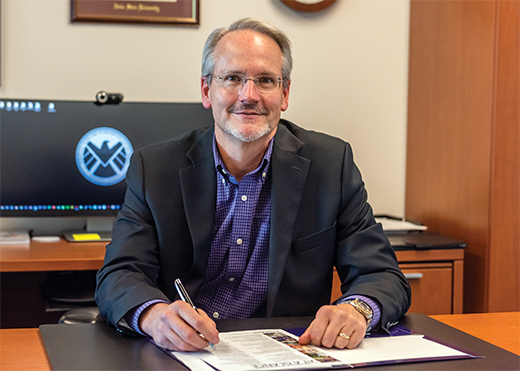Computer science initiative expands programming fundamental offerings to small colleges, high schools
Thursday, Jan. 28, 2021

Scott DeLoach, Kansas State University professor and department head of computer science. | Download this photo.
MANHATTAN — An initiative by Kansas State University could soon bring university computer programming courses to high schools and small colleges across the state, providing students with an in-demand job skill.
K-State's Computational Core Initiative, offered by the computer science department in the Carl R. Ice College of Engineering, is a set of programming courses designed to provide students of any major with the fundamental knowledge to utilize programming in a variety of situations. The initiative's courses focus less on programming theory, so advanced mathematics classes such as calculus are not required — college algebra is sufficient to take the courses.
"Programming is the skillset that makes students stand out in the 21st century job market," said Scott DeLoach, professor and department head of computer science at K-State. "Using computers to solve problems is a key part of the modern, technology-driven workplace."
While the initiative's original goal was to integrate computer science classes into other degree programs offered at K-State — which has happened with a certificate program offered and a new integrated computer science degree — the initiative's vision has expanded.
Through the Computational Core Initiative's Academic Partners Program, K-State computer science courses have seen enrollment success at Manhattan Christian College this spring, with upcoming plans to offer the courses to more small colleges regionally.
The Computation Core Initiative is multifaceted in that it uses the same basic courses to make computer science available to non-computer science majors online, on campus and throughout the region at smaller colleges lacking resources or expertise to offer their own classes in this area, DeLoach said.
At the high school level, the initiative's Cyber Pipeline program was piloted at Manhattan High School in fall 2020 with 18 students enrolled in the first course through a hybrid setup. The students learned online but also had a teacher in their classroom to help with questions. Enrollment for the spring semester is at 12 students, all attending class in person. Both Manhattan High School and Basehor-Linwood High School in Leavenworth County have signed onto the program for the 2021-2022 school year.
"Our vision is for computer science to be taught in all high schools in Kansas at no cost to the students," DeLoach said. "Right now we are projecting a $100 cost to school districts for each student in a yearlong course. In the coming years we are expecting even more high schools across the state will be on board, with possibly even a Missouri high school now that K-State is offering in-state tuition to Missouri residents."
Prospective high school teachers and administrators can find more information at cs.ksu.edu/core/cyber_pipeline.
DeLoach has plans to expand the initiative's outreach even further.
"We basically want to provide a set of highly modular educational components that can be integrated into computer-related education from middle school through college, and even adult education," he said.
